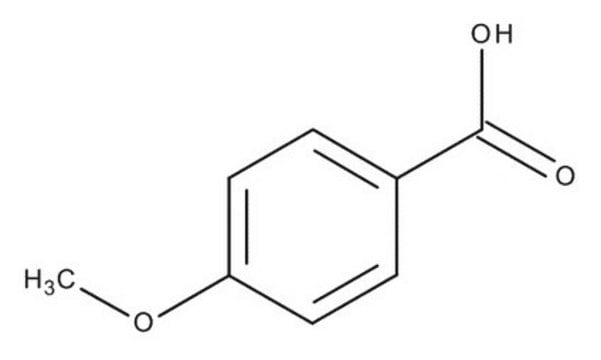117390
4-Methoxybenzoic acid
ReagentPlus®, 99%
Synonym(s):
p-Anisic acid, 4-Methoxybenzoic acid, p-Methoxybenzoic acid, Draconic acid
About This Item
Recommended Products
Quality Level
product line
ReagentPlus®
Assay
99%
mp
182-185 °C (lit.)
solubility
H2O: soluble 2500 parts
alcohol: freely soluble
boiling water: soluble
chloroform: freely soluble
diethyl ether: freely soluble
ethyl acetate: freely soluble
functional group
carboxylic acid
SMILES string
COc1ccc(cc1)C(O)=O
InChI
1S/C8H8O3/c1-11-7-4-2-6(3-5-7)8(9)10/h2-5H,1H3,(H,9,10)
InChI key
ZEYHEAKUIGZSGI-UHFFFAOYSA-N
Looking for similar products? Visit Product Comparison Guide
General description
Application
Legal Information
Storage Class Code
13 - Non Combustible Solids
WGK
WGK 1
Flash Point(F)
365.0 °F - closed cup
Flash Point(C)
185 °C - closed cup
Personal Protective Equipment
Choose from one of the most recent versions:
Already Own This Product?
Find documentation for the products that you have recently purchased in the Document Library.
Customers Also Viewed
Our team of scientists has experience in all areas of research including Life Science, Material Science, Chemical Synthesis, Chromatography, Analytical and many others.
Contact Technical Service










